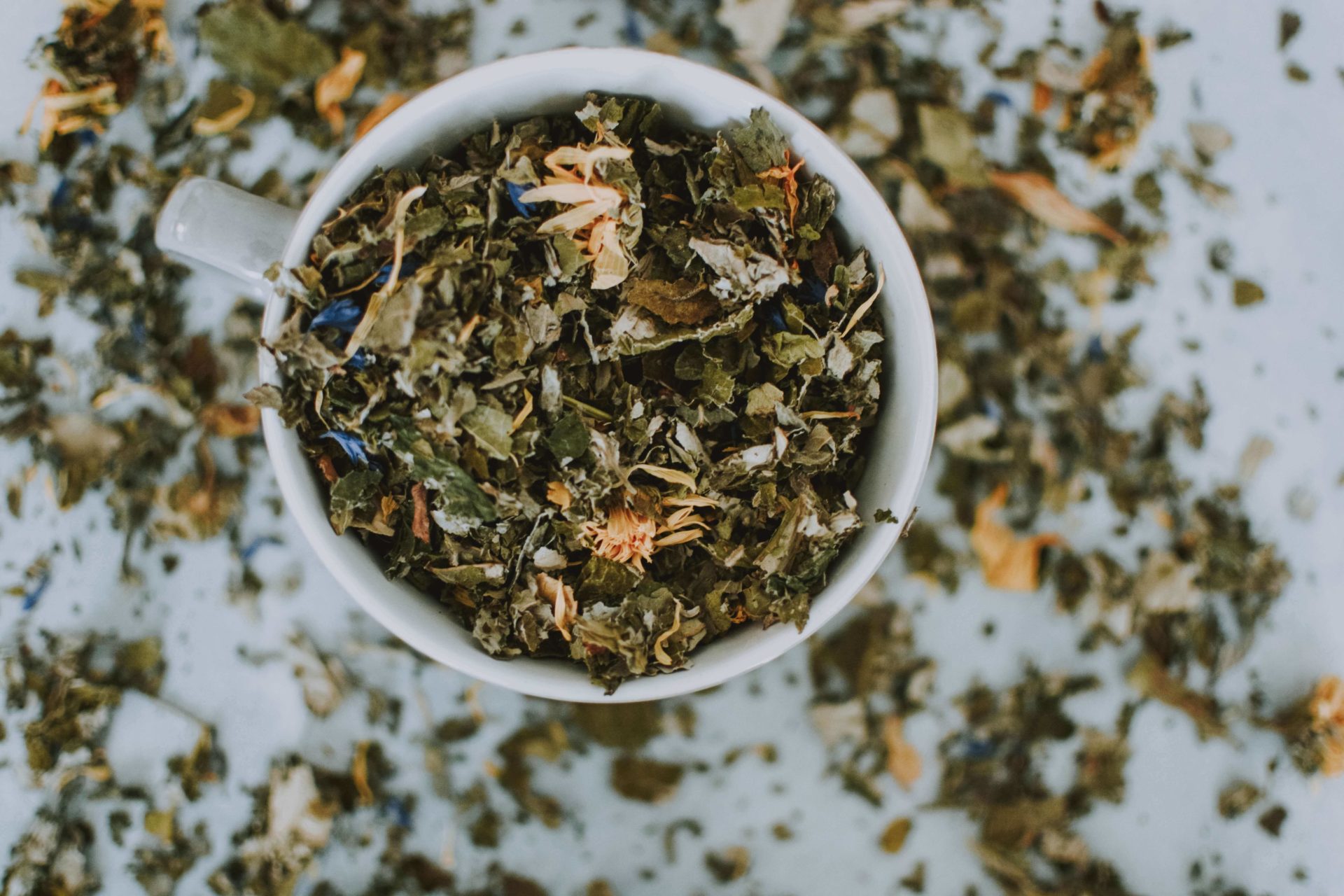
Herbals Teas for Late Pregnancy and Beyond
By Andrea Vannelli
The third trimester officially begins at the 28th week of pregnancy. It’s a time of significant increase in fetal size, so keeping up with nutrient and mineral needs is important for the health of both baby and mom. However, the typical late-pregnancy maternal weight gain of one-half to a pound per week can make mom uncomfortable, with extra pressure on internal organs and the challenge of finding comfortable sleep positions. We often see an increase in anxiety and excitement as the due date draws closer. All of this is a normal part of the process. Here are a few friendly teas from the plant kingdom that can help ease moms through the energetic challenges of late pregnancy and early post-partum.
Red raspberry (Rubus idaeus) leaf is a well-known uterine tonic that has been used for centuries as a natural remedy for pregnancy, childbirth and menstruation. It contains a plant alkaloid called fragarine that helps to both tone and relax the pelvic muscles, having an overall balancing effect on the muscular action of the uterus. It is also high in nourishing substances that assist the uterine muscle with its ability to contract and relax. These include A, B, C and E vitamins, which prevent oxidative stress and improve energy expenditure at the cellular level. This plant is rich in minerals and electrolytes like magnesium, potassium, calcium, iron and manganese. Taken regularly in the last trimester can make labor easier by strengthening the uterus and preventing complications such as premature membrane rupture, which can lessen the need for medical intervention. The mild astringing properties of red raspberry leaf can help prevent excessive bleeding postpartum, and can assist with uterine prolapse. The taste is similar to a slightly fruity version of green tea, but without caffeine. Start this one after the 36th week, and continue for a few weeks after birth. The typical dose is 1-3 cups daily. Note red raspberry tea has a mild laxative effect, so if you find your stool is too loose then simply scale back your consumption as necessary.
Stinging nettle (Urtica dioica) leaf is a great strengthener and nourisher that helps replenish and rebuild energy. It also has significant anti-inflammatory activity and is chock full of nutrients, including vitamins A, C and K as well as iron, calcium, magnesium and other trace minerals. It’s one of the most commonly used herbs for off-setting the relative anemic condition which presents as part of late pregnancy and thus can help provide relief from fatigue. Nettle tea can also ease leg cramps, reduce post-partum hemorrhage, and enrich breast milk. Nettle is a delicious early summer green that is best picked when tender, and be eaten cooked in various ways. Prepared as a tea, it imparts a rich infusion with a mild spinach flavor. The typical dose is 1-2 cups daily.
The immature tops of oat (Avena sativa) straw, also known as milky oats, is deeply nourishing for the nervous system. It’s rich in a range of minerals including silica, magnesium, phosphorus, chromium, iron, zinc and calcium, as well as A, B and C vitamins. It has a profound, restorative effect on the nerves and a long history of use in treating insomnia and anxiety. It’s also a mild diuretic that can help with late third-trimester edema and swelling. Milky oat tea benefits cognition promotes relaxation and can calm the nervous system if experiencing pre-labor jitters. This herb has mild anti-depressant properties, helping to boost energy without being overly stimulating. This herb is great for supporting stamina and overall endurance when one is feeling exhausted, so is an excellent choice for post-partum recovery and the demands of new motherhood. Milky oat tea has a flavor that is light, grassy and slightly sweet. The suggested dose is 1-4 cups per day. As a bonus, it can be used as a bath infusion to soothe itchy skin.
Passionflower (Passiflora incarnata) is a nervine and anxiolytic, meaning it has a very calming, soothing effect on the nervous system, and can help with anxiety and restless sleep during the last few weeks prior to birth. This works well as a tea, and can be combined with other calming herbs such as lavender, lemon balm and chamomile for an enhanced effect. It may be best to take a couple of hours before bed to avoid waking due to a need for urination. Note the passionflower is best reserved for use on an occasional, as-needed basis during late pregnancy and not for long stretches of daily use. Lavender, chamomile and lemon balm however are generally safe for tea infusions on a daily basis in the third trimester. Passionflower tea has a pleasant, mild flavor that is slightly earthy and grassy. The typical dose is 1-2 cups per day.
References
The Herbal Academy https://theherbalacademy.com/3-raspberry-leaf-benefits-for-women/
https://theherbalacademy.com/a-family-herb-stinging-nettle-leaf-uses/ and https://theherbalacademy.com/oats-benefits-getting-to-know-avena-sativa/
Hoffman, D. (2003). Medical Herbalism: The Science and Practice of Herbal Medicine. Healing Arts Press.
Kennedy, D. O., Bonnländer, B., Lang, S. C., Pischel, I., Forster, J., Khan, J., Jackson, P. A., & Wightman, E. L. (2020). Acute and Chronic Effects of Green Oat (Avena sativa) Extract on Cognitive Function and Mood during a Laboratory Stressor in Healthy Adults: A Randomised, Double-Blind, Placebo-Controlled Study in Healthy Humans. Nutrients, 12(6), 1598. https://doi.org/10.3390/nu12061598
Khayat, S., Fanaei, H., & Ghanbarzehi, A. (2017). Minerals in Pregnancy and Lactation: A Review Article. Journal of clinical and diagnostic research : JCDR, 11(9), QE01–QE05. https://doi.org/10.7860/JCDR/2017/28485.10626
Romm, A., Hardy, M. L., & Mills, S. (2017). Botanical Medicine for Women’s Health, pp 398–415. (2nd ed.) Churchill Livingstone.
Terzioglu Bebitoglu B. (2020). Frequently Used Herbal Teas During Pregnancy – Short Update. Medeniyet medical journal, 35(1), 55–61. https://doi.org/10.5222/MMJ.2020.69851


